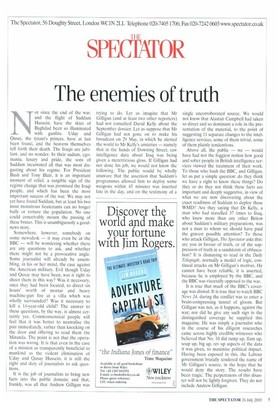The enemies of truth
Not since the end of the war, and the flight of Saddam Hussein, have the skies of Baghdad been so illuminated with gunfire. Uday and Qusay, the tyrant's princes, have at last been found, and the heavens themselves tell forth their death. The Iraqis are jubilant, and no wonder. In their sadism, egomania, luxury and pride, the sons of Saddam incarnated all that was most disgusting about his regime. For President Bush and Tony Blair, it is an important moment of relief, a tangible sign of the regime change that was promised the Iraqi people. and which has been the most important success of the war. We may not yet have found Saddam, but at least his two most monstrous lieutenants can no longer bully or torture the population. No one could conceivably mourn the passing of these brutes. This is unambiguously a goodnews story.
Somewhere, however, somebody on some newsdesk — it may even be at the BBC — will be wondering whether there are any questions to ask, and whether there might not be a provocative angle. Some journalist will already be assembling, in his or her mind, the case against the American military. Evil though Uday and Qusay may have been, was it right to shoot them in this way? Was it necessary, once they had been located, to direct six hours' worth of mortar and heavy machine-gun fire at a villa which was wholly surrounded? Was it necessary to kill a 14-year-old child? The answer to these questions, by the way, is almost certainly yes. Commonsensical people will feel that it was better to neutralise the pair immediately, rather than knocking on the door and offering to read them the Miranda. The point is not that the operation was wrong. It is that even in the case of a mission as transparently beneficial to mankind as the violent elimination of Uday and Qusay Hussein, it is still the right and duty of journalists to ask questions.
It is the job of journalists to bring new facts into the public domain; and that, frankly, was all that Andrew Gilligan was trying to do. Let us imagine that Mr Gilligan (and at least two other reporters) had not consulted David Kelly about the September dossier. Let us suppose that Mr Gilligan had not gone on to make his broadcast on 29 May, in which he alerted the world to Mr Kelly's anxieties — namely that in the hands of Downing Street, raw intelligence data about Iraq was being given a meretricious gloss. If Gilligan had not done his job, we would not know the following. The public would be wholly unaware that the assertion that Saddanfs programmes allowed him to deploy some weapons within 45 minutes was inserted late in the day, and on the testimony of a
single uncorroborated source. We would not know that Alastair Campbell had taken so direct and so dominant a role in the presentation of the material, to the point of suggesting 11 separate changes to the intelligence services, some of them trivial, some of them plainly tendentious.
Above all, the public — we — would have had not the foggiest notion how good and sober people in British intelligence services viewed the treatment of their work. To those who bash the BBC, and Gilligan, let us put a simple question: do they think we have a right to know these things? Do they or do they not think these facts are important and deeply suggestive, in view of what we are now discovering about the exact readiness of Saddam to deploy these WMD? Are they saying that Dr Kelly, a man who had travelled 37 times to Iraq, who knew more than any other Briton about Saddam's military preparations, was not a man to whom we should have paid the gravest possible attention? To those who attack Gilligan, The Spectator asks this: are you in favour of truth, or of the suppression of truth in a sandstorm of obfuscation? It is dismaying to read in the Daily Telegraph, normally a model of logic, continual attacks on Mr Gilligan's motives. He cannot have been reliable, it is asserted, because he is employed by the BBC, and the BBC was viscerally opposed to the war.
It is true that much of the BBC's coverage was dismal. It is true that to watch BBC News 24, during the conflict was to enter a brain-compressing tunnel of gloom. But Gilligan was not, as it happens, against the war; nor did he give any such sign in the distinguished coverage he supplied this magazine. He was simply a journalist who in the course of his diligent researches came across highly credible witnesses who believed that No. 10 did ramp up, flam up, soup up, big up, rev up aspects of the data it was given, to maximise political impact. Having been exposed in this, the Labour government brutally tendered the name of Mr Gilligan's source, in the hope that he would deny the story. The results have been tragic. The perpetrators of this disaster will not be lightly forgiven. They do not include Andrew Gilligan.


























































 Previous page
Previous page